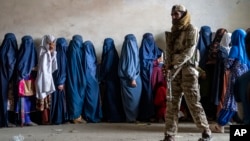The United States marked Human Rights Day this month and the 75th anniversary of the Universal Declaration of Human Rights by imposing visa restrictions and sanctions on 37 individuals in 13 countries.
With these actions, “the United States is addressing some of the most challenging and harmful forms of human rights abuses in the world, including those involving conflict-related sexual violence, forced labor, and transnational repression,” said Secretary of State Antony Blinken in a statement.
Many of these new designations target individuals responsible for gender-based violence and the repression of women and girls globally, including county commissioners and a governor in South Sudan whose forces and militias are responsible for rape and Taliban leaders connected to restrictions on access to secondary education for women.
“The Iranian regime continues to be one of the worst human rights offenders both at home and abroad,” said Secretary Blinken. “Its abuses include the repression of dissidents and peaceful protestors through lethal force, arbitrary detention, and torture as well as the targeting of dissidents abroad through surveillance, intimidation, and lethal plotting.” In response, the United States has designated two Iranian intelligence officers involved in recruiting individuals to plot against regime opponents in the United States, including current and former U.S. Government officials, as well as surveillance activities focused on religious sites, businesses, and other facilities.
Additionally, the State Department issued the Uighur Human Rights Policy Act Report to Congress, and the Treasury department has sanctioned two People’s Republic of China government officials for their connection to serious human rights abuses in Xinjiang.
The Stated Department is also revising, expanding, and issuing visa restriction policies for Zimbabwe, Syria, and Uganda to promote accountability for government officials and others involved in repression, human rights abuses, and other unacceptable acts.
Finally, four criminal gang leaders in Haiti involved in human rights abuses, including sexual violence, and five Democratic Republic of Congo armed group leaders were designated by the United States. These designations complement previous U.S. efforts to disrupt criminal activity in Haiti, including a State Department Transnational Organized Crime Rewards Program reward offer of up to $1 million and $2 million for information leading to the arrest and/or conviction of Joseph Wilson and Vitel’homme Innocent, respectively.
The United States will continue to use all available tools to promote accountability and signal its strong support for human rights and fundamental freedoms.














